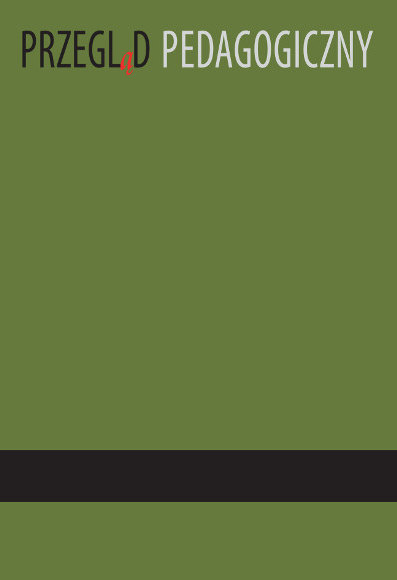Lessons in taming fear with Hannah Arendt
DOI:
https://doi.org/10.34767/PP.2025.01.01Keywords:
education, fear, Hannah Arendt, natality, emancipatory pedagogy, Jacques Rancière, neoliberalismAbstract
Contemporary education increasingly becomes a space where anxiety permeates all aspects of school life—from the pressure of grading systems to uncertainty resulting from rapid social and political transformations. Drawing on Hannah Arendt’s thought, this article examines how education can either sustain fear through mechanisms of control and selection or serve as a space for overcoming it through reflection and action. The analysis is grounded in Arendt’s concept of natality—the ability to initiate new beginnings—and the contrast between education as a space of oikos (adaptation and survival) and polis (community and agency). In light of neoliberal reforms and the increasing instrumentalization of education, the article highlights the need to transform schools into environments that foster intellectual autonomy and active participation in public life. Emphasis is also placed on the role of Jacques Rancière’s emancipatory pedagogy and critical thinking as tools for resisting fear and submission. The analysis leads to the conclusion that education, if it is to be a space of freedom, must become a place where individuals learn not only to adapt to reality but also to transform it in the name of amor mundi.
References
Apple M.W. (2006). Understanding and interrupting neoliberalism and neoconservatism in education. Pedagogies, 1(1), 21–26.
Arendt H. (1987). Eichmann w Jerozolimie: rzecz o banalności zła. Kraków: Znak.
Arendt H. (2008). Korzenie totalitaryzmu. Warszawa: Wydawnictwa Akademickie i Profesjonalne.
Arendt H. (2010). Kondycja ludzka. Warszawa: Aletheia.
Biedrzycki K. (2019). Lęk przed interpretacją. W: M. Trysińska i K. Maciejak (red.), Kompetencje nauczyciela polonisty we współczesnej szkole. Między schematyzmem a kreatywnością (s. 197–205). Warszawa: Wydawnictwa Uniwersytetu Warszawskiego.
Biesta G. (2010). Good Education in an Age of Measurement: Ethics, Politics, Democracy. Boulder: Paradigm Publishers.
Biesta G. (2013). Learning in public places: Civic learning for the twenty-first century. W: Civic learning, democratic citizenship and the public sphere (s. 1–11). Dordrecht: Springer Netherlands.
Berkowitz R. (2010). Thinking in Dark Times: Hannah Arendt on Ethics and Politics. New York: Fordham University Press.
Bourdieu P. i Passeron J.-C. (1990). Reprodukcja: Elementy teorii systemu nauczania. Warszawa: Państwowe Wydawnictwo Naukowe.
Dykalska-Bieck D. i Szałkowska K. (2024). Lęk jako cecha i jako stan a FOMO i płeć u dzieci i młodzieży w drugim etapie edukacji szkolnej w województwie warmińsko-mazurskim w okresie pandemii COVID-19 i wybuchu wojny w Ukrainie. Nieopublikowany materiał. Referat wygłoszony podczas IV Kongresu Młodej Nauki 11–13 lipca 2024 roku w Gdańsku.
Foucault M. (2009). Nadzorować i karać: narodziny więzienia. Warszawa: Aletheia.
Gawlik I. (2021). Oczekiwania nauczycieli i rodziców wobec nauczyciela edukacji wczesnoszkolnej. Parezja. Forum Młodych Pedagogów Przy Komitecie Nauk Pedagogicznych PAN, 16(2), 69–78.
Jagielska K. (2022). Autorytet zawodu nauczyciela w opinii studentów studiów nauczycielskich. Annales Universitatis Mariae Curie Skłodowska, sectio J–Paedagogia-Psychologia, 34(4), 153–170.
Kierkegaard S. (2014). The concept of anxiety: A simple psychologically oriented deliberation in view of the dogmatic problem of hereditary sin. New York: WW Norton & Company.
Klus-Stańska D. (2012). Wiedza, która zniewala – transmisyjne tradycje w szkolnej edukacji. Forum Oświatowe, 24(1), 21–40.
Komorowska H. (2022). Nauczyciel pod presją. W: D. Gabryś-Barker i R. Kalamarz (red.), Współczesna glottodydaktyka wobec zmian edukacyjnych. Nowe wyzwania i innowacyjne rozwiązania (s. 13–26). Katowice: Wydawnictwo Uniwersytetu Śląskiego.
Lee J. i Park J. (2023). AI as “Another I”: Journey map of working with artificial intelligence from AI-phobia to AI-preparedness. Organizational Dynamics, 52(3), 100994.
Łukowski K. (2021). Profilaktyka społeczna jako działalność intensyfikująca odporność psychiczną. Kultura i Edukacja, 3(133), 211–225.
Melosik Z. (2003). Funkcjonalno-strukturalna interpretacja edukacji. W: T. Gmerek (red.), Edukacja i stratyfikacja społeczna. Poznań: Wolumin.
Olejniczak K. (2024). Popularni nauczyciele rzucają papierami. Dlaczego akurat teraz? Portal Samorządowy.
Ostrowicka H. i Rzyska A. (2016). Racjonalny strach? O pedagogii lęku w dyskursie publicznym. Forum Oświatowe, 28(1), 181–198.
Popow M. (2023). Międzykulturowe uczenie się w doświadczeniu polskich nauczycieli po wybuchu wojny w Ukrainie w 2022 r. Teraźniejszość – Człowiek – Edukacja, 25(2), 65–87.
Potulicka E. i Rutkowiak J. (2010). Neoliberalne uwikłania edukacji. Kraków: Oficyna Wydawnicza Impuls.
Przyborowska B. (2006). Przyszłość kształcenia w kulturze wysokiej tolerancji niepewności. Rocznik Andragogiczny, 21–27.
Rancière J. (1991). The ignorant schoolmaster: Five lessons in intellectual emancipation. Paris: Foyard.
Rutkowiak J., Stankiewicz Ł., Stańczyk P. i in. (2021). Powrót do systemu? Dyskusja redakcyjna wokół tekstu Zbigniewa Kwiecińskiego z 1980 roku. Ars Educandi, 18, numer specjalny, 29–48.
Syper-Jędrzejak M. (2022). Wypalenie zawodowe wśród pracowników oświaty – metody pomiaru i przegląd badań realizowanych w Polsce. e-mentor, 93(1), 26–36.
Tomaszek K. i Muchacka-Cymerman A. (2020). Wypalenie szkolne u adolescentów: raport z badań polsko-amerykańskich. Kraków: Wydawnictwo PETRUS.
Warner D. (2010). Young people, their technology and the fear in schools. Telecommunications Journal of Australia, 60(4), Article 4.1.
Wineburg S. (2018). Why learn history (when it’s already on your phone). Chicago: University of Chicago Press.
Zamojski P. (2015). Co to znaczy, że szkoła jest „publiczna”. Studia Pedagogiczne, 65, 73–92.
Downloads
Published
Issue
Section
License

This work is licensed under a Creative Commons Attribution-NoDerivatives 4.0 International License.

